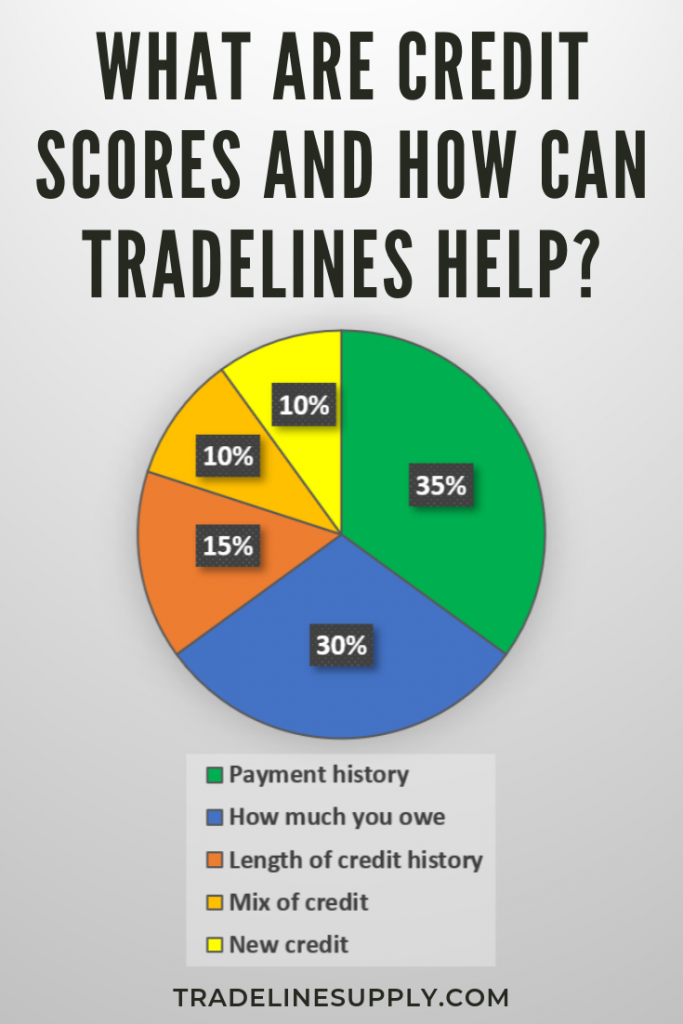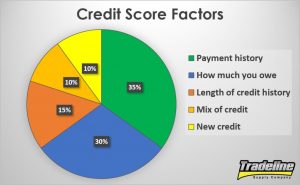What Are Credit Scores and How Can Tradelines Help?

What Is a Credit Score?
A credit score is a 3-digit number that is meant to represent your credit risk, or how likely you are to default on a loan. This credit rating is calculated based on the information in your credit report, which lists your current and recent credit accounts.
To use an analogy, your credit report is like your school transcript: it is a list of your current and recent credit accounts and how well you did in paying them off on time. Your credit score rating is like your overall GPA: it sums up all of that credit history information into a single number.
While there are many different versions of credit scores, most lenders use a FICO credit score. Another credit score, called the VantageScore, was developed by the three major credit bureaus: Equifax, Experian, and TransUnion. The VantageScore is primarily used for educational purposes rather than lending decisions.
Both the VantageScore and the FICO credit scores range from a low of 300 to the highest score of 850. Lower numbers represent a higher likelihood of defaulting on a loan, which is considered bad credit, while higher numbers represent a lower likelihood of defaulting on a loan, which is considered good credit.
Why Is Your Credit Score Important?
If you ever want to buy something using credit instead of cash—a house or a car, for example—you’ll likely want to have a good credit score. Your credit score is what lenders use to decide whether or not they should loan you money and what the terms of that loan should be.
If you have a bad credit score or no credit score at all, you may have a hard time getting credit from lenders.
If you don’t have a credit score or credit history at all, lenders don’t have a way of judging your creditworthiness. Therefore, they may see you as too much of a risk and decline your request for credit.
If you do have a credit score, lenders will see it as a representation of how risky it is to lend money to you. A great credit score means you are a low-risk borrower, which means lenders can offer you low interest rates and other perks, such as credit card rewards.
On the other hand, a low credit score represents a high risk to lenders, since it shows that you may be more likely to default on a loan. To compensate for the higher risk of default, lenders charge higher interest rates and fees to those with poor credit scores—if they are willing to extend credit at all.
Your credit score doesn’t just affect your access to credit and the costs associated with using credit. Credit scores have increasingly been used for a variety of non-credit applications.
Phone carriers and utility providers may require a security deposit based on the results of your credit check.
A significant percentage of employers do credit checks on prospective employees, so a bad credit score could cost you your dream job.
Your credit score may affect what you pay for insurance, so you’ll want to have a good credit score if you want to get the best insurance rates.
Landlords often check credit scores of applicants to see how reliable they are in paying their bills.
Utility providers and even cell phone carriers may check your credit score to determine whether to charge you a security deposit upfront.
As you can see, credit scores affect a lot more than just your ability to get credit, and it is more important than ever to prioritize building your credit score.
What Factors Determine Credit Scores?
Although the specific algorithms behind credit scores are closely-guarded trade secrets, the general categories that affect credit scores are widely known. In general, here’s what makes up a credit score:
Payment history: 35%. This is the most important piece of your credit score, so even one late or missed payment can do a lot of damage.
Utilization (how much you owe): 30%. Your utilization ratio is the ratio of the amount of debt on all your revolving accounts (e.g. credit cards) to your total available revolving credit, expressed as a percentage. Credit scores may account for both your overall utilization ratio and the utilization ratio of each individual tradeline. The lower your utilization, the better for your credit score.
Length of credit history: 15%. This category considers factors like your average age of accounts, the age of the oldest account in your credit file, and the ratio of “seasoned” to non-seasoned tradelines. A seasoned tradeline is defined as one that is at least two years old, at which point it is believed that the account begins to have a more positive impact on your credit score. The more age your accounts have, the more they will help your credit score.
These five main factors affect your credit score.
Credit mix: 10%. Creditors want to see that you can responsibly use different types of credit, so they look for a variety of accounts in your credit report, including both revolving credit accounts and installment loans.
New credit: 10%. This credit score category takes into account any new inquiries and new accounts that you have added in the past 6 to 12 months. Creditors consider seeking new credit a risky behavior, so inquiries can hurt your score. Opening a new account can also have a temporary negative effect on your score since it has no age or payment history.
What Is a Good Credit Score?
Scores between 670 and above are considered good credit scores. Very good credit scores lie between 740 and 799 while excellent credit scores include scores of 800 and above.
Which credit score is the best? Only about 1% of Americans have the coveted 850, a perfect credit score.
Credit scores range between 300 and 850, with 850 being the best credit score possible.
How to Get a Good Credit Score
The most important factor of a good credit score is a history of on-time payments.
Here are some things that can help you get a good credit score:
A history of on-time payments
Low utilization ratios
Accounts that are at least 2 years old
A mix of different revolving and installment accounts
Minimal inquiries
Monitoring your credit report for errors
Learn more about how to increase your credit score with do-it-yourself credit repair strategies and our guide to how to get an 850 credit score.
What Is a Bad Credit Score?
According to Investopedia, credit scores of 579 or below are considered bad credit scores, with 61% of borrowers in this credit score range being predicted to become delinquent on future loans.
Credit scores in the range between 580 and 669 are considered fair because only 28% of these borrowers are predicted to become delinquent on future loans. Unfortunately, even those with fair credit scores often have difficulty getting credit and higher interest rates than those with good or excellent credit scores.
Bad credit scores can have serious consequences that reach farther than just your finances. For more on bad credit, its effects, and how to fix it, check out our article on bad credit.
Here are some things that can lead to a bad credit score:
Having too much debt can bring down your credit score.
Late or missed payments
High credit card balances
Low account age
Not enough accounts
Too many inquiries
Collections
Judgments
Foreclosure
Bankruptcy
Identity theft
How to Build Credit
To build credit, you’ll need to open your own credit accounts and keep them in good standing by always making payments on time. This is the foundation of a good credit score.
Once you build credit by piggybacking, you can open your own accounts to continue building your credit score.
However, as we mentioned, it can be difficult to start building credit since lenders typically want to see a credit score and credit history before extending credit.
The fastest way to build credit, especially for those who have a limited credit history, is to piggyback on the credit of someone else. Examples of credit piggybacking include getting a cosigner or guarantor in order to qualify for credit, opening a joint account with someone, or being added as an authorized user.
Once you have started to establish a credit history by piggybacking, you can continue to build up your credit by opening up more tradelines. You can also add tradelines to your credit file that already have years of perfect payment history to help balance out the effects of any derogatory accounts.
Remember, tradelines are the foundation of building credit because all credit starts with tradelines.
How to Improve Your Credit Score
If you need to fix your credit score, there are some strategies you can use to repair your credit score yourself, such as disputing errors on your credit report and paying down high credit card balances.
Since payment history makes up the majority of your credit score, the most important thing is to get all of your accounts current and make sure to make all payments on time in the future, and your credit score should gradually recover.
When it comes to boosting your credit score, lasting results will require patience, good financial practices, and knowledge of how the credit system works. Use our free educational resources to learn more about credit scores, building credit, and how tradelines can help add credit history to your credit report.
Ready to buy tradelines? See our updated tradeline list now.
Read more: tradelinesupply.com






